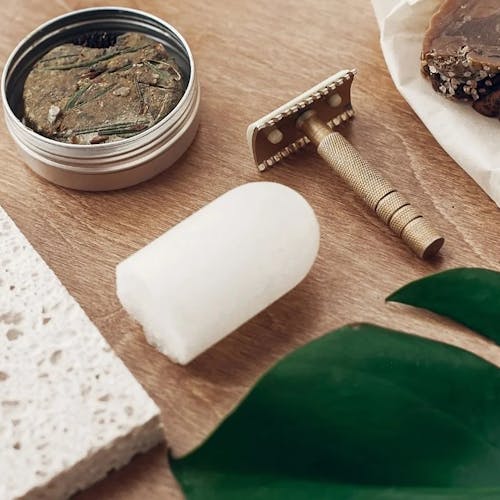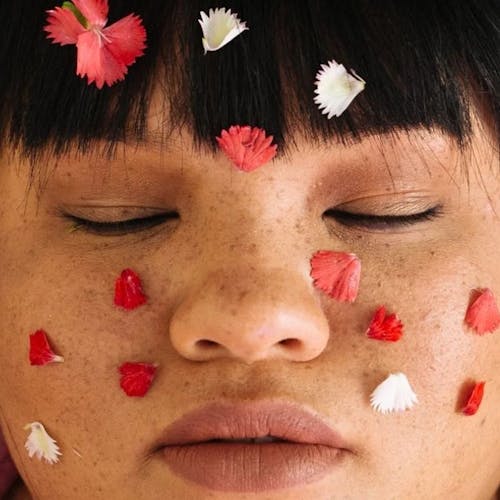This website uses cookies to enhance the user experience. By using Yoppie you are agreeing to our use of cookies.
What's My Skin Type? Get The Facts
Written by Yoppie
26 Jul 2021
What does your ‘skin type’ mean?
What factors determine skin type?
What’s ‘normal’ skin?
What about ‘oily’ skin?
What if I have ‘dry’ skin?
How do I know if I have ‘combination’ skin?
What does ‘sensitive’ skin actually mean?
How do I find out my skin type?
Why does my skin type change around my period?
Are “skin types” really a thing? They are indeed! 90% of people report their skin improved over lockdown as they spent more time looking after it, and taking time to understand your skin type can help you see great results. While the different types might be a little confusing, our mission is to have you all clued up by the end of this blog. We’re breaking down the 5 main skin types, how to identify yours, and more. Let’s get informed on that face of yours…
What does your ‘skin type’ mean?
Everyone on earth will have their own unique skin type, and the products that work for one won’t have exactly the same benefits for another. That said, it’s usually possible to categorise skin into one of 5 types identified by the American Academy of Dermatology (AAD), depending on things like water content, oiliness, sensitivity, and more.
What factors determine skin type?
Your genetics impact your skin type, but other factors also determine this. Your daily routine, local weather, and sun exposure all play a part. Also, as you age, skin loses elasticity and is more prone to dryness and sensitivity. Then there are conditions like eczema, psoriasis and rosacea. And of course, your lifestyle. If you don’t use sunscreen, eat a lot of junk food, or are a regular smoker, these things affect your skin. A healthy lifestyle equals healthier skin.
What’s ‘normal’ skin?
It’s often argued that there’s no such thing as ‘normal’ skin, but this term typically describes skin that does not suffer from things like oily patches, dryness, sensitivity, blemishes, and so on. People with normal skin are the lucky ones whose skin naturally produces the ideal amount of sebum to keep skin hydrated evenly without becoming greasy.
What about ‘oily’ skin?
Oily skin has overactive sebaceous glands, meaning skin produces more sebum than needed, creating a greasy, shiny look. With oily skin you may notice larger pores, which means they clog easier, leading to spots and blackheads. Oily skin is common in teens going through puberty due to fluctuating hormones, which leads to a greasy T-zone (forehead, nose and chin) that’s more likely to experience breakouts.
What if I have ‘dry’ skin?
If you have dry skin, your skin produces less sebum than it needs, which can cause your face to feel tight, itchy, and even become flaky or cracked in places. Dry skin means a lack of moisture, and this can happen naturally as we age, so if you’re approaching menopause you may start to experience your skin becoming drier than you remember. Very dry skin can become itchy and painful, and can lead to eczema which may need specialist treatment.
How do I know if I have ‘combination’ skin?
Combination skin is a mix; the T-zone tends to become oily while the cheeks stay dry. The toughest thing about caring for combination skin is striking the right balance, as products that work to reduce one problem could exacerbate another. Various products may be needed, like a mild cleanser to wash cheeks, and an anti-acne product for the T-zone. You may need to try products longer than most, but finding a balance will make it all worthwhile.
What does ‘sensitive’ skin actually mean?
Sensitive skin tends to become irritated easily or experience allergic reactions, and get breakouts or redness. While other skin types are determined by how much sebum the skin produces, sensitive skin is not, and it can affect those with dry, oily or combination skin too. Around 70% of women and 60% of men report having sensitive skin, so it’s common. You’ll know if you have sensitive skin if it burns, stings or itches when applying products.
How do I find out my skin type?
Most people guess their skin type based on the above criteria, but if you want a more detailed assessment, there are some exercises you can try:
- Monitor your skin on a typical day and ask questions like ‘is my T-zone shiny and are my cheeks matte?’, ‘do I have flaky patches?’, ‘how long does this last?’ and so on.
- On a normal day, wash your face with a gentle cleanser and apply nothing else. Wait 30 minutes, look in the mirror and ask the above questions again.
- If you think you have oily skin, assess pore size, blackheads, and monitor how well your makeup stays on each day. Products that shrink pores can help with oily skin.
- Press blotting sheets onto different sections of your face to see how much oil they absorb. Normal skin has very little residue. Dry skin has even less, oily skin has a lot, and combination skin will have more on the T-zone and less on the cheeks.
- Experiment with how often you should moisturise - if you have dry skin you’ll need to apply moisturiser a lot more frequently than someone with oily skin.
- Visit a dermatologist for an unbiased opinion on skin health and products to try. Many dermatologists have technology that offers an accurate assessment of your skin type.
Remember that your skin might not fit into one of the categories above, and that’s OK. No matter who you are, even if your skin type isn’t ‘normal’, your skin woes are.
Why does my skin type change around my period?
Sorry to throw a spanner in your sebum, but skin can do a U-turn around your period. Hormone fluctuations cause some people to experience period-related acne, as menstruation can intensify things like acne, psoriasis and eczema. Luckily, when your period goes, skin issues tend to disappear too. Happy days!
Do you have questions about your skin type, and what the heck is going on with it during your cycle? Give us a shout in our private Facebook group or on Insta @itsyoppie. Don't forget that our personalised period box can get organic tampons, hormonal supplements and much more delivered easily and regularly through your letterbox so you've got one less thing to keep track of each cycle.
Section jump
Back to top
Subscribe To Our Newsletter
YOPPIE





© 2026 Yoppie is a registered trademark of Phlo Technologies Ltd.
Yoppie's supplements are not a substitute for a varied diet and healthy lifestyle and are not intended to diagnose, treat, or cure any disease. If you are pregnant, breastfeeding, have a medical condition or are under medical supervision, please consult with your doctor before taking any of our products.






